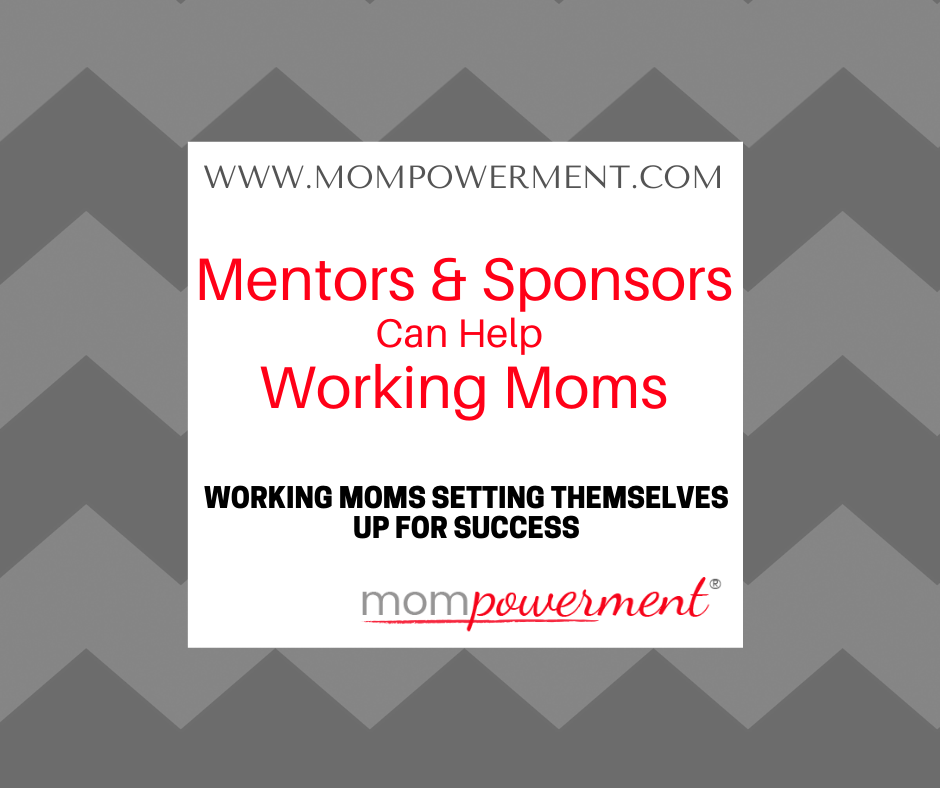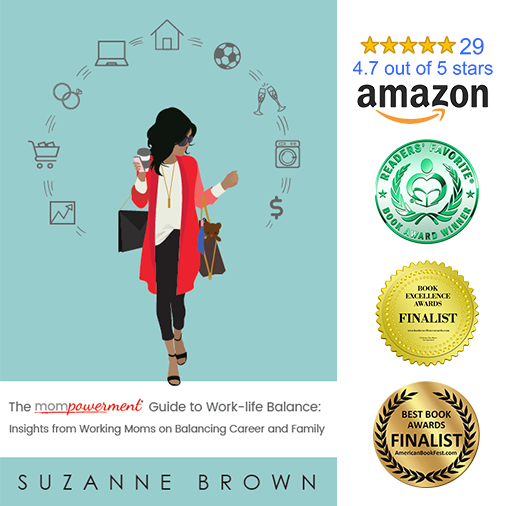
The Mompowerment brand is all about empowering working moms who want to excel in their career (or build a business) and be the moms they want to be. For those working moms who are at a company, advancing your career isn’t only about doing great work. You can have both. It’s doable. You must advocate for yourself and have others who advocate on your behalf. It’s only about mentors. A combination of mentors and sponsors is what will truly help working moms.
(If you’re building your business, read this post on Mentors, Sponsors, and Mom Entrepreneurs).
What’s the Difference Between Mentors and Sponsors?
In the simplest terms, mentors provide guidance on your career decisions and sponsors are more action-oriented when it comes to creating opportunities at work. Sava Berhane shares the difference between mentors and sponsors in her Fast Company article: “A mentor is an informal career counselor…and a sponsor is someone who can help advance [your career].” Essentially, you can bounce ideas off of a mentor, but a sponsor will open doors for you and take action on your behalf. In my own career and in the stories I heard in the 110+ interviews I did for the Mompowerment books, it seems that both mentors and sponsors are important when it comes to advancing your career in the workplace. (Tune in for Part II where I cover the entrepreneurial perspective on mentors and sponsors.)
Your Tribe
It’s important to have a tribe you can speak with about your situation and challenges, regardless of what you want for your career at any given moment. You want those in your professional tribe to help you move closer to your goals. That includes family, friends, friends of friends, colleagues, allies, mentors, and sponsors. It’s great to have support from colleagues and those in similar roles. Even with a strong tribe, you still want those more senior influencers rooting for you.
Working moms specifically need mentors and sponsors to keep them moving up in the ranks, but also to provide guidance and support as it relates to being a working mom. Wouldn’t it be helpful to get insights from someone who has already been there or has someone on their team in your shoes? Who doesn’t want a person in her corner to understand her needs and help open the right doors? Yep, more than your tribe, those are mentors or sponsors.
Peer Mentors
In addition to traditional mentors, you can also consider peer mentors. You can create an online or in-person group (especially if you’ve headed back to the office) of people at around the same level in their careers and journey, who can mentor each other. I highly recommend including fellow moms or moms–to-be, who might be dealing with challenges you’ve already dealt with or vice versa. And they can include colleagues, even those in other departments, who are facing similar challenges within your company. Or maybe working moms and moms to be in the same industry, but at another company. Many of the tips below apply to peer mentors as well.
And, especially after the year we’ve all had as working mothers, we need to feel comfortable sharing tips, tracks, hacks, and tools with each other.
As a working mom, you’re juggling a lot. More than 2 million women, many of whom were working mothers, left the workforce because it was all too much. We need to share what’s helping us so we don’t lose more working mamas.
Mentors and Flexibility for Working Moms
I wanted to take a moment to specifically talk about mentors and work-life balance. If you’re a working mom and want to get more time with your family, you might want a big change such as continuing to work remotely post-pandemic or a transition to a professional part-time role or job share. A mentor can be integral when making this move.
Most of the moms I interviewed didn’t specifically talk about “mentors,” but many shared that they talked to other moms further along in their careers. These more senior moms gave advice on what to do or what to avoid. They were essentially mentors.
Mentors
So, now you get it. You’re looking for someone who can be on your own personal board of directors. Yep, that means you can have more than one. You want more senior people, either at your manager’s level or a few levels u. That way they still remember what you’re going through and give realistic advice and ideas for how to take action. And I highly recommend that you have at least one working mom on that personal board of directors who can relate to your current season of motherhood.
Have at least one mentor who is a strong advocate for working moms. Your mentors can be men or women. They might or might not be parents, but they will have good advice for you as a future (or current) mom.
Where to Find Mentors
Consider more senior people at your employer in your department or others. Perhaps they are people who led projects you worked on. Maybe it’s a manager who has moved up. Look at up-and-coming leaders in your industry outside of your employer. Speak to people you hear at conferences or read about. Start those conversations and see if they lead to a natural fit for mentorship.
The beauty is that so much content has moved online and so many speakers have social media since in-person conferences aren’t happening. You can do all of this networking from your home. Follow speakers’ social media profiles. Comment on what they post and share their content with your own spin and thoughts.
Tips to Have a Stronger Relationship with your Mentor
How do you make the most of the relationships with mentors? A few things can help:
- Take your time to build these relationships. Start having conversations before they become necessary. Maybe that’s even before you become a mom. Or before you’re looking to ask for more flexibility. You don’t want to find mentors while making changes if you can avoid it. You want that information beforehand.
- Be strategic. Find the right mentors to talk to for your needs. Set goals on networking like you do all other strategic areas in your life. Find a good fit for personality, style, and approach to career. Don’t feel you have to mimic his or her career or work style, but you do need to be able to learn from it.
- Have more than one mentor. It’s helpful to have more than one perspective, maybe even from various levels above you. Remember, it’s your board of directors. Include people at different career stages as well.
- Establish a communication approach or style from the beginning. Decide when, where/how, and how often you’ll meet. Will you have a more formal or informal approach?
- Get the most out of each interaction. Be respectful of his or her time (and of your own) and prepare for your conversations. Know the points you want to cover and send an agenda beforehand if it’s more formal. Be engaged during your interaction and use active listening skills.
- Follow up. After each interaction, follow up and say thank you to your mentor for his or her time, insights, advice, etc. Share any a-has or next steps. A simple email or even a handwritten note is great.
- Evaluate over time. Don’t be afraid to make changes over time. It could be your needs change. It could be your mentor has a more demanding role and less time available. Keep in touch because you never know when your paths will cross again. Maybe they become more of a sponsor down the road.

Sponsors
Unlike a mentor, sponsors will promote your accomplishments and skills, help you make connections with more senior leaders inside and outside of the company, and help you get more exposure.
Although I didn’t realize it at the time, I often had a sponsor at the large marketing agencies where I worked throughout my career before becoming an entrepreneur. They were often the senior lead on the team and reported to the senior leadership team or on that team. They saw something in me and were willing to help position my skills to new potential managers or recommend me for new opportunities. I considered them mentors, but they were so much more than that. Now I know they were actually more like sponsors.
Finding the Right Sponsor
Now that you understand more about the role of a sponsor, the challenge becomes finding a sponsor that is the right fit for both of you.
- Look at your current network. Analyze your current network to see if you have connections who are currently mentors and are at a senior level. Maybe it’s someone who was previously a manager or even a manager’s manager. They might not be at the company anymore and that’s OK.
- They showed an interest in your career previously. Sponsors must be willing to take on a more active role in your career moving forward, so think about conversations you might have had with senior leaders about your career path.
- You’ve followed his or her advice previously. Look for senior people in your current network who have given advice that you have used and can show how their advice made a difference in your career. Let them know that and share the results.
- Consider previous projects. If you’ve worked on a high-profile project in the past few years, consider reaching out to someone senior who seemed impressed with your work. He or she has already seen you in action and understands what you’re capable of.
- Find a sponsor whose legacy you can support. According to Sylvia Ann Hewitt’s Harvard Business Review article, sponsors can be looking for someone to help support their legacy with the company or industry. If you can fit into their legacy and you’re interested in their support, it might be the perfect fit.
What Can You Do for Your Mentor and Sponsor?
Both of these types of relationships should be a two-way street. How can you help your mentor or sponsor? Sure, they want to mentor or sponsor someone, but there is more to it. Hewitt suggests that you offer to share your knowledge or skills as it relates to projects he or she is working on. When in doubt, ask what he or she needs and how you can help. Share relevant articles that you read. Introduce him or her to the right resources, if it’s not you. Be generous with your time and knowledge.
Already have a relationship with a mentor or sponsor? How did you find him or her? How do you keep that relationship going?
Want more ideas about mentors and sponsors? You can download my Network Where You Are Guide to get loads of ideas and tips.


